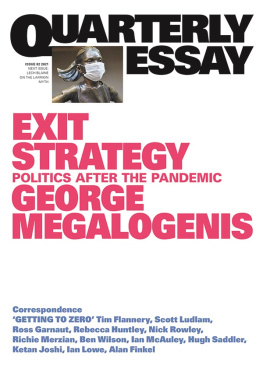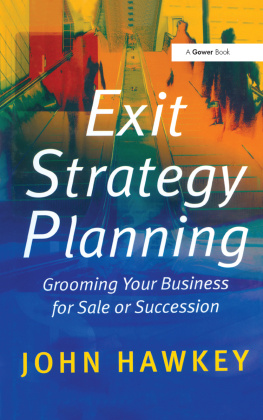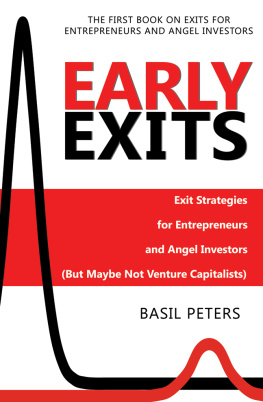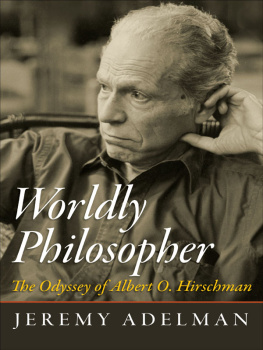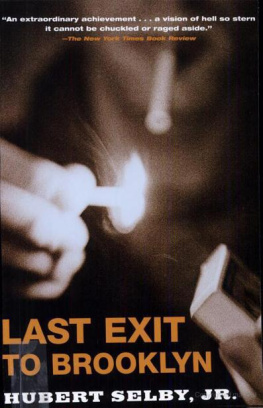Exit,
Voice,
and
Loyalty
Exit,
Voice,
and
Loyalty
Responses to Decline
in Firms, Organizations,
and States
Albert O. Hirschman
Harvard University Press
Cambridge, Massachusetts and London, England
Copyright 1970 by the President and
Fellows of Harvard College
All rights reserved
Library of Congress Catalog Card Number: 77-99517
ISBN 0-674-27660-4
Printed in the United States of America
To Eugenio Colorni (19091944),
who taught me about small ideas
and how they may grow
Preface
This is an unpremeditated book. It has its origin in an observation on rail transport in Nigeria which occupied a paragraph in my previous book, reproduced here at the start of . One critic objected to that paragraph because, as he charitably expressed himself, there must be a lot of assumptions hidden there somewhere. After a while I decided to pursue these assumptions into their hiding places and was soon off on an absorbing expedition which lasted the full year that I had planned to spend in leisurely meditation at the Center for Advanced Study in the Behavioral Sciences.
The principal reason for which I persevered will be obvious to the reader: I had come upon a manner of analyzing certain economic processes which promised to illuminate a wide range of social, political, and indeed moral phenomena. But this book does not use the tools of one discipline for the purpose of annexing another. As is shown particularly in the appendixes, the concepts I develop can be translated into the language of traditional economic analysis, and may possibly enrich it; but by no means do they uniquely belong there. I rather became concerned that the concepts of exit and voice might be too broad as my writing expanded with surprising ease into ever new territories. The principal concession I made to these worries was to keep this book short. Otherwise, having found my own unifying way of looking at issues as diverse as competition and the two-party system, divorce and the American character, black power and the failure of unhappy top officials to resign over Vietnam, I decided to let myself go a little.
The Center provided a particularly favorable environment ; and to Tjailing Koopmans who helped sharpen some of the technical arguments, as did Robert Wilson of the Stanford Business School.
The finished manuscript was read by Abram Bergson and Albert Fishlow who both made a number of incisive comments and suggestions. At an earlier stage, I derived considerable benefit from seminars at Harvard, Yale, and Boston College where I discussed some of my ideas. In the course of 1967, David S. French searched for precursors to them in the vast literature on competition, fortunately without much success.
It was gratifying that Philip G. Zimbardo, professor of psychology at Stanford University, found some of my hypotheses of sufficient interest to plan for an experimental verification. The proposed research is described in an appendix.
Hildegarde Teilhet typed and retyped the manuscript with zest and skill.
My wife, who contributed so much to my previous books, wisely decided she would make me enjoy the California sunshine vicariously.
Stanford, California
July 1969
A.O.H.
Contents
Introduction
and Doctrinal Background
Under any economic, social, or political system, individuals, business firms, and organizations in general are subject to lapses from efficient, rational, law-abiding, virtuous, or otherwise functional behavior. No matter how well a societys basic institutions are devised, failures of some actors to live up to the behavior which is expected of them are bound to occur, if only for all kinds of accidental reasons. Each society learns to live with a certain amount of such dysfunctional or mis-behavior; but lest the misbehavior feed on itself and lead to general decay, society must be able to marshal from within itself forces which will make as many of the faltering actors as possible revert to the behavior required for its proper functioning. This book undertakes initially a reconnaissance of these forces as they operate in the economy; the concepts to be developed will, however, be found to be applicable not only to economic operators such as business firms, but to a wide variety of noneconomic organizations and situations.
While moralists and political scientists have been much concerned with rescuing individuals from immoral behavior, societies from corruption, and governments from decay, economists have paid little attention to repairable lapses of economic actors. There are two reasons for this neglect. First, in economics one assumes either fully and undeviatingly rational behavior or, at the very least, an unchanging level of rationality on the part of the economic actors. Deterioration of a firms performance may result from an adverse shift in supply and demand conditions while the willingness and ability of the firm to maximize profits (or growth rate or whatever) are unimpaired; but it could also reflect some loss of maximizing aptitude or energy with supply and demand factors being un-changed. The latter interpretation would immediately raise the question how the firms maximizing energy can be brought back up to par. But the usual interpretation is the former one; and in that case, the reversibility of changes in objective supply and demand conditions is much more in doubt. In other words, economists have typically assumed that a firm that falls behind (or gets ahead) does so for a good reason; the conceptcentral to this bookof a random and more or less easily repairable lapse has been alien to their reasoning.
The second cause of the economists unconcern about lapses is related to the first. In the traditional model of the competitive economy, recovery from any lapse is not really essential. As one firm loses out in the competitive struggle, its market share is taken up and its factors are hired by others, including newcomers; in the upshot, total resources may well be better allocated. With this picture in mind, the economist can afford to watch lapses of any one of his patients (such as business firms) with far greater equanimity than either the moralist who is convinced of the intrinsic worth of every one of his patients (individuals) or the political scientist whose patient (the state) is unique and irreplaceable.
Having accounted for the economists unconcern we can immediately question its justification: for the image of the economy as a fully competitive system where changes in the fortunes of individual firms are exclusively caused by basic shifts of comparative advantage is surely a defective representation of the real world. In the first place, there are the well-known, large realms of monopoly, oligopoly, and monopolistic competition: deterioration in performance of firms operating in that part of the economy could result in more or less permanent pockets of inefficiency and neglect; it must obviously be viewed with an alarm approaching that of the political scientist who sees his politys integrity being threatened by strife, corruption, or boredom. But even where vigorous competition prevails, unconcern with the possibility of restoring temporarily laggard firms to vigor is hardly justified. Precisely in sectors where there are large numbers of firms competing with one another in similar conditions, declines in the fortunes of individual firms are just as likely to be due to random, subjective factors that are reversible or remediable as to permanent adverse shifts in cost and demand conditions. In these circumstances, mechanisms of recuperation would play a most useful role in avoiding social losses as well as human hardship.
Next page




